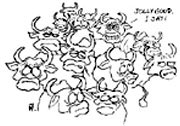All that is bad...
 OTULA OWUOR NAIROBI
OTULA OWUOR NAIROBI
the fear that deadly European products and wastes easily end up in Africa was again confirmed when Kenyan customs and health authorities impounded at least 3.2 tonnes of suspected British 'madcow beef' being dumped into the country.
The importation of the beef suspected to carry a transmissible brain disease generated much anger because of earlier local press reports that conservative British politicians had made it clear that Africa, with its food shortages and famine, was an ideal destination for the potentially lethal British beef. The Kenyan government acted fast and took strong actions which included even the withdrawal of the trading license of Nakumatt, the country's rapidly expanding supermarket chain accused of importing the beef.
The beef had arrived at the Indian Ocean port of Mombasa aboard the ship Annamaria with documents alleging that the consignment came from Brazil.However, authorities claimed that a closer scrutiny indicated it came from Britain. Both the British government and the exporting firm, John West of Liverpool, which allegedly supplied the corned beef to Nakumatt, could not immediately answer questions posed by the Kenyan press. However, the firm later said that its corned beef was free of bovine spongiform encephalopathy or the dreaded madcow disease. Britain promised to issue a full report after investigating the issue which could easily strain its relationship with Kenya.
The fear of Europe exporting the deadly disease to Africa had not been confined to Kenya. Tanzania recently rejected high quality heifers sent as donation from Ireland where at least a fatal case of madcow disease in humans was reported last November. The us $600,000 donation was destined to improve the quality of local cattle and, therefore, help boost milk and beef production for farmers in central and western parts of Tanzania.
Farmers have also been warned not to import semen from uk . However, there is already a fear that this may be too late. The ministry of agriculture in Kenya is on the lookout and has said that suspected cases of madcow disease must be reported. The latest incident comes close on the heels of last year's attempted importation of radioactive milk powder which had arrived at the port of Mombasa from the Netherlands.
Allegations of the presence of the madcow disease in the imported beef continue to generate much fear because according to the World Health Organization (who), it can-not be destroyed by sterilisation or pasteurisation. According to the latest reports of who, the agent causing the madcow disease has spread to 10 nations where cattle or feed was imported from Britain. These nations include Germany, Oman, Canada, Italy, Falklands and Denmark where it was identified only in cattle from Britain, while in France, Portugal, Ireland and Switzerland, it was linked to British cattle feeds.
Goods reaching the port of Mombasa travel to the whole of central and eastern Africa where some nations - like the war-ridden Somalia, Sudan, Zaire, Rwanda and Burundi - have no facilities that can detect and impound such products.
Related Content
- Status report by DM, Doda regarding waterbody pollution in Bhaderwah, Doda, Jammu & Kashmir, 24/03/2025
- Order of the Supreme Court regarding air pollution in Delhi, 02/12/2024
- Report of Jammu and Kashmir Pollution Control Committee regarding steps taken to arrest pollution of waterbodies in Bhaderwah, Jammu & Kashmir, 30/11/2024
- Order of the National Green Tribunal regarding illegal mining in village Handakundi, Solan district, Himachal Pradesh, September 25, 2023
- Does food insecurity hinder migration?: experimental evidence from the Indian public distribution system
- Report by Karnataka State Pollution Control Board regarding waste management in Gokarna, Uttara Kannada district, Karnataka, 07/07/2023
